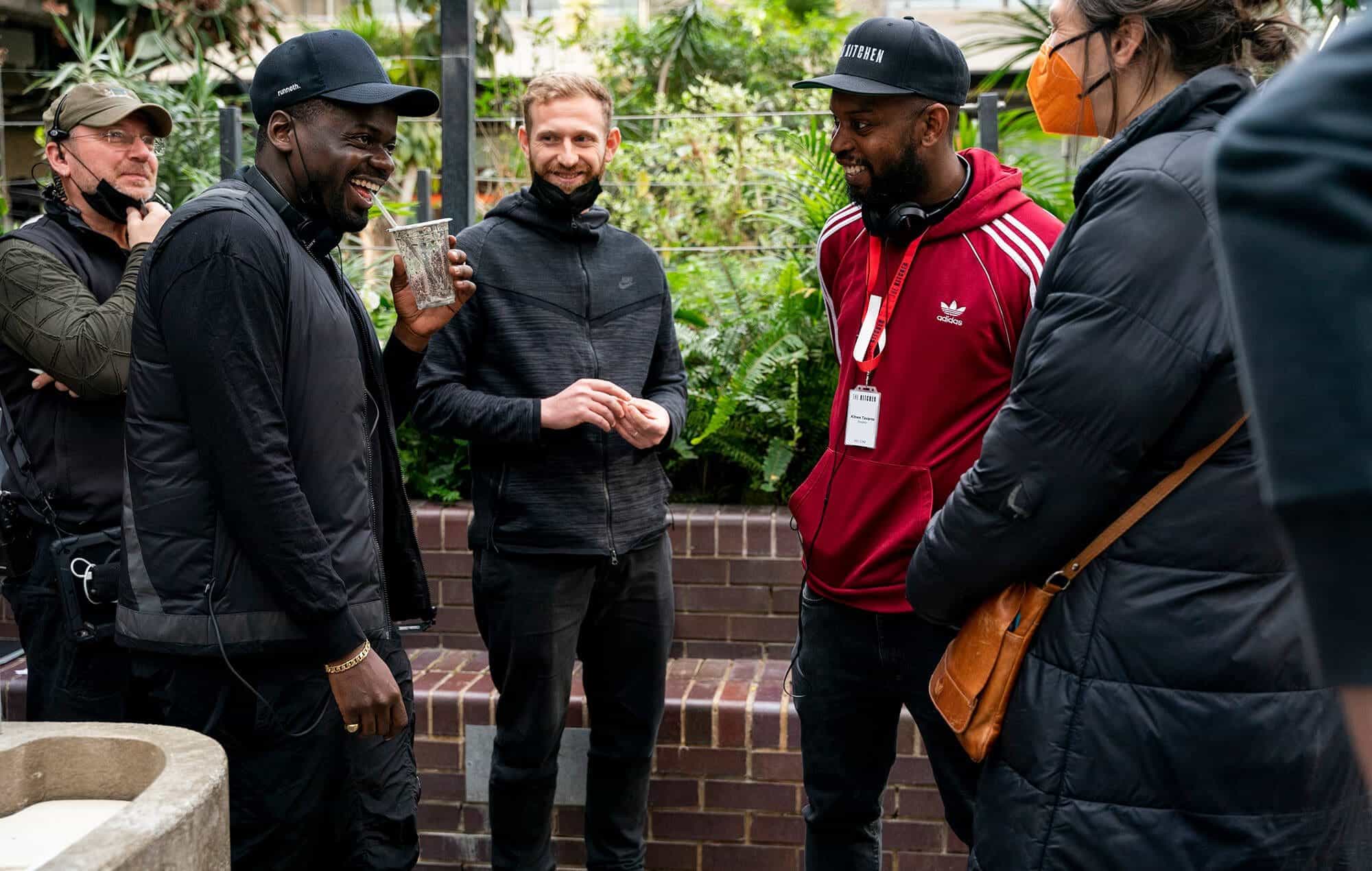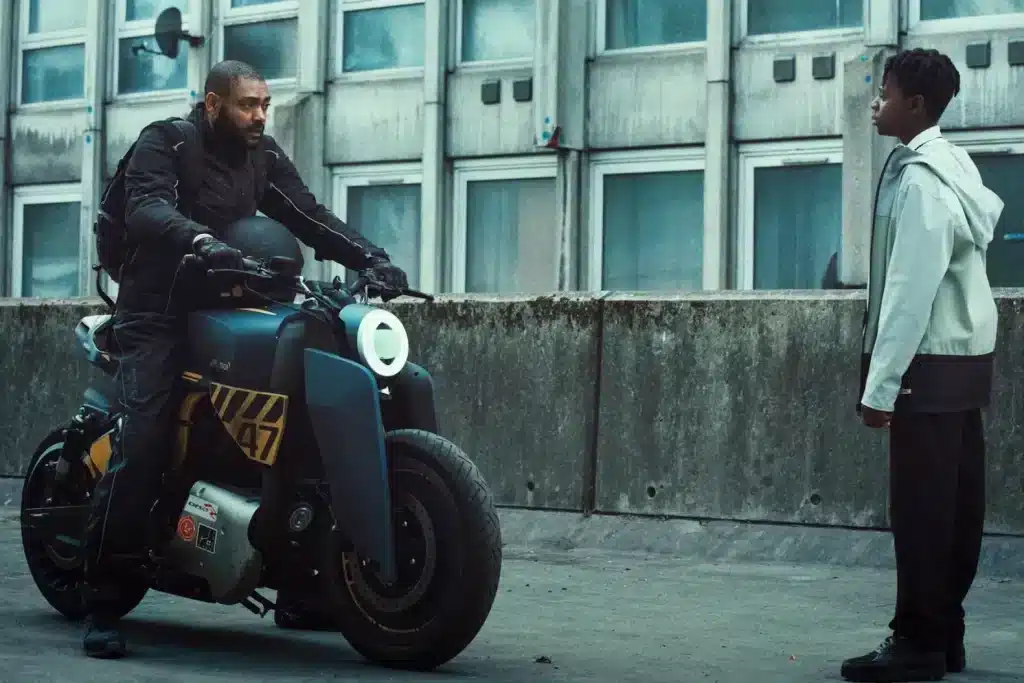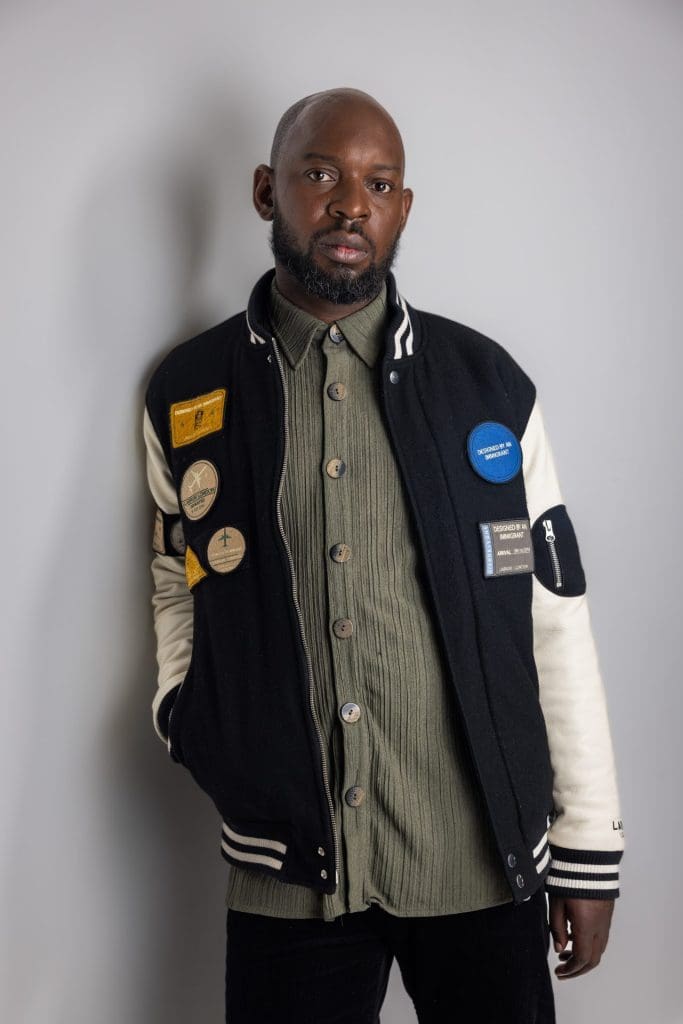
It seems obvious, but who is better placed to create a film universe from scratch than an architect? In his debut full-length feature with Daniel Kaluuya, Kibwe Tavares brings his experimental approach to architecture to his latest Netflix sci-fi feature The Kitchen, starring Kane Robinson as a resident of the titular council estate, his ambitions to escape, and the unexpected arrival of his son. It’s a thrilling film, made all the more frenetic by the living and breathing universe Tavares conjures using his expertise as an architect and as a born-and-bred Londoner. Here, the filmmaker speaks to us about The Kitchen, working with Ian Wright, gentrification, and what comes next.
CC: Where did the story for The Kitchen come from?
KT: It really came from Daniel [Kaluuya] and I wanting to work together. He originally pitched an idea based on a story he heard in a barbershop about a heist and then we started talking about London and the conditions of people living here and what drives them to do these things. At the time, I was coming straight out of architecture school, and I was very much focused on that. Architects think about the future and things that are yet to exist. This work was a continuation of what I was studying at University. I wanted to find a new way to share my vision of London.
CC: How did your education in architecture inform the world building in the film?
KT: It was a mix of things. It was part of the process of trying to define what we were communicating. For me, one of the core ideas was how to visualise the idea that London is all of these communities stuck together, living in villages beside each other. I did lots of research, drawings and diagrams, as well as collage in the planning stage. All of the practical things I learned from school. From this comes the guideline that informs the visual rules of the world, and how that bleeds into the different aesthetics, whether it’s costume, production design, and more. It all started from cataloguing and researching.
CC: Were there any cinematic references?
KT: There weren’t too many. I actually studied Ridley Scott and Blade Runner before, and I was always impressed with how he used things that were local to him as inspiration. That became a big influence. I remember speaking with Ben Hammersley, who advises governments on future technologies, and we spoke about world building with him early on, and about how Blade Runner specifically and how everything had its own life in that film. That became a key principle of how we use technology in the film. Technology also doesn’t need to mean the flashy, new stuff. There were also references that weren’t dystopian at all, like Bicycle or thrillers like La Haine where the environment is so integral to the story. We then built a Bible, and from there built a timeline of what happened to the UK by the start of the film and that became a guiding principle.

CC: Bikes and bicycles play a big part in the film. What do they represent?
KT: They became a big part of the film. Ultimately, they represent the idea of freedom and escape. In some ways, the bikes mean different things to characters and their lives. For Benji, it was access—a way for him to leave home and find a new one. We were looking all around the world at other places [or slums] like the Tower of David in Venezuela, a vertical favela where bikes are used to move around. If you think of the favelas in Brazil, using bikes is all about going into the city and feeling free to, not go undetected, but to move at your own pace.
CC: There are moments of joy in the midst of the bleakness. I’m thinking about the Candy dance scene halfway through the film.
KT: That was massive for us. We didn’t want it to be one-note. You can also get into this quite milquetoast poverty porn where you’re just portraying the bad side. I personally grew up on a council estate in Stockwell, South London and there was so much life. I wanted to show you the true value of the community and also the warmth, while also showing the problems. It was important not to show the Kitchen as a place of resilience that’s human. The pancake scene was supposed to show this duality. On one hand, the characters in the scene might smash-and-grab trucks for food, but they’re also cooking together and I enjoyed the idea that this tough character grows his own cumin and is embarrassed when his friends find out.
CC: Ian Wright’s performance as the Kitchener character is excellent. Why was he perfect to portray the figurehead of the community?
KT: His character came later in the scripting process. We wanted someone who represented the community, and he’s from South London and a lot of people do see him as an uncle figure. He’s someone that could speak to that community aspect and also could carry empathy in his performance. When he came for the role, it felt natural. But he was so nervous because he didn’t want to get the job just because he’s Ian Wright, and we didn’t want to make it seem like stunt casting. He was really dedicated and perfect for the Kitchener.
CC: This feels like a very British, or more specifically, a London, story. How does that translate to audiences, say, in the United States?
KT: I think the more specific something is, the more reach it has. This is fundamentally a story about people trying to save their home and that’s a very universal, human thing. Whether you’re in London or the USA, you can see yourself in that story. But it had to be specific at the start. We asked ourselves, “How can we talk about stuff that is important to Londoners?” and then it became a universal message.

CC: The film is full of symbolism. Was that always in mind when building its distinct landscape?
KT: Yes. It’s about London and how it changes. I’m from London, and I always see it as an organism, because it’s constantly shapeshifting. When we started, I was trying to buy a house, and I had a decent job and yet it didn’t seem fathomable. How does this even work? So we started discussing how people get pushed out, how areas become more expensive. This became the core thing we wanted to talk about: our place in London as Londoners. The Kitchen was this last remaining housing estate hub free of gentrification.
CC: Did the narrative come before the process of building the world or after? I’m talking especially about the father-son story.
KT: Initially we began with our message, and then Daniel and I discussed the narrative. We wanted to find a story that supported the things we were trying to say. We needed that to bring a sense of relatability to the film. This idea of someone trying to come to terms with a new person in their life, while also trying to find their place, and also internalising the world around them in The Kitchen helped bring value to the film. He’s thinking about what’s next, what’s beyond his community, and I know that a lot of people from these communities have that justifiable ambition.
CC: How do you leave this story behind now? You’ve been working on it for such a long time.
KT: I’ve grown on this film since university. I’ve changed with the project. My interests have shifted slightly and so it’s become a massive part of my identity and who I am as a director. It becomes your world, and it feels a bit crazy in the sense that it’s not yours anymore. The themes and ideation will still probably return in future projects. It’s always a part of me. The way characters inhabit locations and environments has a lot of meaning to me, and I spend a lot of time trying to use my experiences with each project. But I am ready for new journeys.
CC: Do you feel like this could be studied at architecture schools?
KT: For sure, and even my short films. I’ve been going around different schools already and lecturing on the process and how the architecture process has influenced my way of thinking and how I make films. I’ve already had people reach out to ask if they can conduct a lecture on The Kitchen. This is definitely something I want more of going forward.
CC: What’s next for you?
KT: I can’t talk too much about it. It’s an animated film for Netflix and I have the same producer, Darla K. Anderson, from Toy Story 3 and Monsters, Inc. It’s about music and a certain musical artist. It’s going to be massive. I like challenges—I can mention that!
The Kitchen is available to watch on Netflix now.





